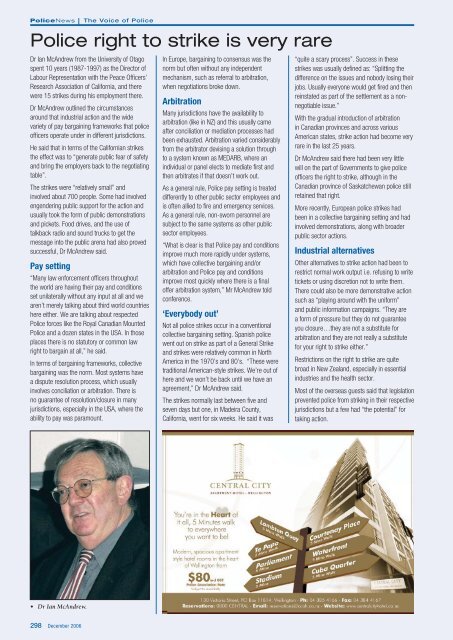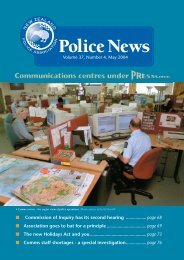<strong>Police</strong><strong>New</strong>s<strong>The</strong> Voice of <strong>Police</strong><strong>Police</strong> right to strike is very rareDr Ian McAndrew from the University of Otagospent 10 years (1987-1997) as the Director ofLabour Representation with the Peace Officers’Research <strong>Association</strong> of California, and therewere 15 strikes during his employment there.Dr McAndrew outlined the circumstancesaround that industrial action and the widevariety of pay bargaining frameworks that policeofficers operate under in different jurisdictions.He said that in terms of the Californian strikesthe effect was to “generate public fear of safetyand bring the employers back to the negotiatingtable”.<strong>The</strong> strikes were “relatively small” andinvolved about 700 people. Some had involvedengendering public support for the action andusually took the form of public demonstrationsand pickets. Food drives, and the use oftalkback radio and sound trucks to get themessage into the public arena had also provedsuccessful, Dr McAndrew said.Pay setting“Many law enforcement officers throughoutthe world are having their pay and conditionsset unilaterally without any input at all and wearen’t merely talking about third world countrieshere either. We are talking about respected<strong>Police</strong> forces like the Royal Canadian Mounted<strong>Police</strong> and a dozen states in the USA. In thoseplaces there is no statutory or common lawright to bargain at all,” he said.In terms of bargaining frameworks, collectivebargaining was the norm. Most systems havea dispute resolution process, which usuallyinvolves conciliation or arbitration. <strong>The</strong>re isno guarantee of resolution/closure in manyjurisdictions, especially in the USA, where theability to pay was paramount.In Europe, bargaining to consensus was thenorm but often without any independentmechanism, such as referral to arbitration,when negotiations broke down.ArbitrationMany jurisdictions have the availability toarbitration (like in NZ) and this usually cameafter conciliation or mediation processes hadbeen exhausted. Arbitration varied considerablyfrom the arbitrator devising a solution throughto a system known as MEDARB, where anindividual or panel elects to mediate first andthen arbitrates if that doesn’t work out.As a general rule, <strong>Police</strong> pay setting is treateddifferently to other public sector employees andis often allied to fire and emergency services.As a general rule, non-sworn personnel aresubject to the same systems as other publicsector employees.“What is clear is that <strong>Police</strong> pay and conditionsimprove much more rapidly under systems,which have collective bargaining and/orarbitration and <strong>Police</strong> pay and conditionsimprove most quickly where there is a finaloffer arbitration system,” Mr McAndrew toldconference.‘Everybody out’Not all police strikes occur in a conventionalcollective bargaining setting. Spanish policewent out on strike as part of a General Strikeand strikes were relatively common in NorthAmerica in the 1970’s and 80’s. “<strong>The</strong>se weretraditional American-style strikes. We’re out ofhere and we won’t be back until we have anagreement,” Dr McAndrew said.<strong>The</strong> strikes normally last between five andseven days but one, in Madeira County,California, went for six weeks. He said it was“quite a scary process”. Success in thesestrikes was usually defined as: “Splitting thedifference on the issues and nobody losing theirjobs. Usually everyone would get fired and thenreinstated as part of the settlement as a nonnegotiableissue.”With the gradual introduction of arbitrationin Canadian provinces and across variousAmerican states, strike action had become veryrare in the last 25 years.Dr McAndrew said there had been very littlewill on the part of Governments to give policeofficers the right to strike, although in theCanadian province of Saskatchewan police stillretained that right.More recently, European police strikes hadbeen in a collective bargaining setting and hadinvolved demonstrations, along with broaderpublic sector actions.Industrial alternativesOther alternatives to strike action had been torestrict normal work output i.e. refusing to writetickets or using discretion not to write them.<strong>The</strong>re could also be more demonstrative actionsuch as “playing around with the uniform”and public information campaigns. “<strong>The</strong>y area form of pressure but they do not guaranteeyou closure…they are not a substitute forarbitration and they are not really a substitutefor your right to strike either.”Restrictions on the right to strike are quitebroad in <strong>New</strong> <strong>Zealand</strong>, especially in essentialindustries and the health sector.Most of the overseas guests said that legislationprevented police from striking in their respectivejurisdictions but a few had “the potential” fortaking action.• Dr Ian McAndrew.298December 2006
<strong>New</strong> <strong>Zealand</strong> <strong>Police</strong> <strong>Association</strong>‘Tuff’ at the topThis column is written by a frontlinepolice officer. It does not representthe views or policies of the <strong>Police</strong><strong>Association</strong>.I hear the cake tinners recently had a ‘top brass’ visitor reporting her carbroken into at the watch-house only to find she had to take a number in thequeue with the workers flat knacker looking after prisoners in the cells, badpeople reporting as required by the courts and mum and dad public reportingcrimes.Apparently ‘Our Lady’ was so aghast at the time delay and the clientelethat changes are afoot for the Capital’s thin blue line. Obviously, rubbingshoulders with the people has given ‘Our Lady’ a new perspective that thecake tinners might benefit from. Time will tell, but it’s always handy to havemates in high places.General Custer’s a comingI also recently heard from a wee bird (Tweetie by any other name) thatOoC…whoops I mean <strong>Police</strong> National Headquarters, were put to the swordabout the new ‘SOS team’ they were seeking to send me mates north of theBombays. When asked how many of the staff they have at the castle andservice centres were going to assist, the silence was deafening. Apparently,backroom workers cannot be called upon to assist the frontline.Perhaps that new stadium they’re all talking about will attract a fewvolunteers.Looking after our ownI’m full of bully this month. Must be the Christmas spirit that’s loosened a fewlips but I hear that one of our districts in the middle of the north recently hadto forbid one of our ‘on call’ workers from driving after our loyal and faithfulsoldier had worked some 30 hours straight.Bully has it that our well intentioned staff took said worker home and, beingthe good buggers they are, promised to pick him up and take him to anyfurther jobs he was called out for. Now I do call that leadership and lookingafter the troops. A big bouquet for the team that looked after this member buta brickbat for the organisation for allowing this to happen.I look forward to the HR direction on this one.Christmas has arrived earlyHow good are those ‘Men in black’? I mean this takes me back to the days of‘95’ when we were superior in every respect! No Jonah, but just a team fullof players that are the envy of every rugby country in the world! Mind you, weknow how we got scuttled last time. However, I think Mr Henry and companyare well smart enough to plan for all eventualities.Have a great Christmas everyone and spend it with those you love the most asanother year slips by. I’m on over the festive season so sleep soundly in theknowledge that someone has your back covered.See Ya!Field Officer requiredPart time (0.5) position<strong>The</strong> NZ <strong>Police</strong> <strong>Association</strong> is looking to appoint a part-time Field Officer,based in Dunedin, to cover the Southern <strong>Police</strong> District.This position involves promoting the <strong>Police</strong> <strong>Association</strong>, Welfare Fund andthe <strong>Police</strong> Credit Union amongst our members and providing advice onand representing their industrial and welfare needs and entitlements.Applicants should have:• A solid understanding and empathy with <strong>Police</strong> and the environment inwhich they work;• Familiarity with employment rights, agreements and principles;• Advanced inter-personal skills;• Self motivation, initiative and good organisational skills; and• Familiarity with Microsoft Word, Excel and Office products.Applicants will need a reliable motor vehicle available for travel in andaround Dunedin and must be able to demonstrate a suitable home officeenvironment.This will be a challenging and rewarding role for the successfulapplicant.Written applications marked “Confidential” and including a current CVshould be sent to:Debbie WingNZ <strong>Police</strong> <strong>Association</strong>PO Box 12344WellingtonEmail: dwing@policeassn.org.nzApplications close Friday January 19, 2007.A position description and person specification is available upon request.A bad dayA police officer in a small town stopped a motorist who was speeding downthe main street. “But officer,” the man began, “I can explain.”“Just be quiet,” snapped the officer. “I’m going to let you cool your heels injail until the chief gets back.”“But, officer, I just wanted to say...”“And I said to keep quiet! You’re going to jail!”A few hours later the officer looked in on his prisoner and said, “Lucky foryou that the chief’s at his daughter’s wedding. He’ll be in a good mood whenhe gets back.”“Don’t count on it,” answered the fellow in the cell. “I’m the groom.”Use of 0800 Ten Nine phone line<strong>Association</strong> representatives maintain this telephone line (0800 8366 463) on a24-hour basis.It is to be used ONLY for matters that cannot be deferred, such as <strong>Police</strong> shootings,fatal pursuits or deaths in custody.Important and immediate industrial and legal advice can then be arrangedthrough the <strong>Association</strong> networks.Please do not phone this line for non-urgent matters.We remember…Who passed away…HODGE Joan May 14-Aug-06 Widow of member WanganuiBREACH James Carey 7-Oct-06 Retired member AucklandAPATU Nepe Raana 4-Nov-06 Retired member HastingsFAHEY Marie <strong>The</strong>rese 5-Nov-06 Member ChristchurchKELLY Ernest Charles 11-Nov-06 Retired member CoromandelREID Norman Robert James 12-Nov-06 Retired member HamiltonGORDON Arthur Basil 13-Nov-06 Retired member <strong>New</strong> PlymouthSMITH Yvonne Vivian 28-Nov-06 Wife of retired member HamiltonDecember 2006299

















